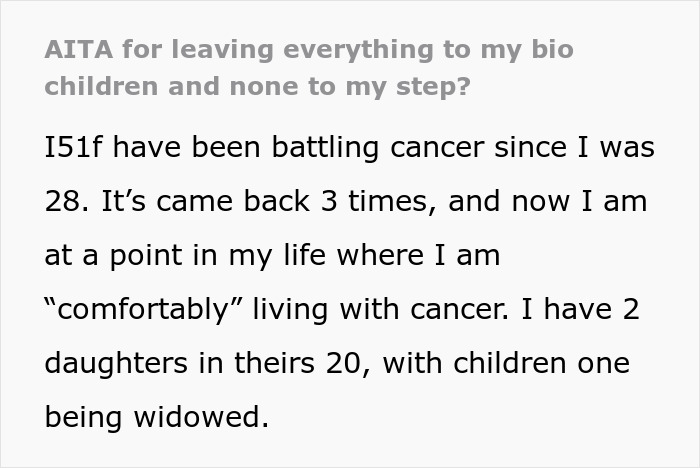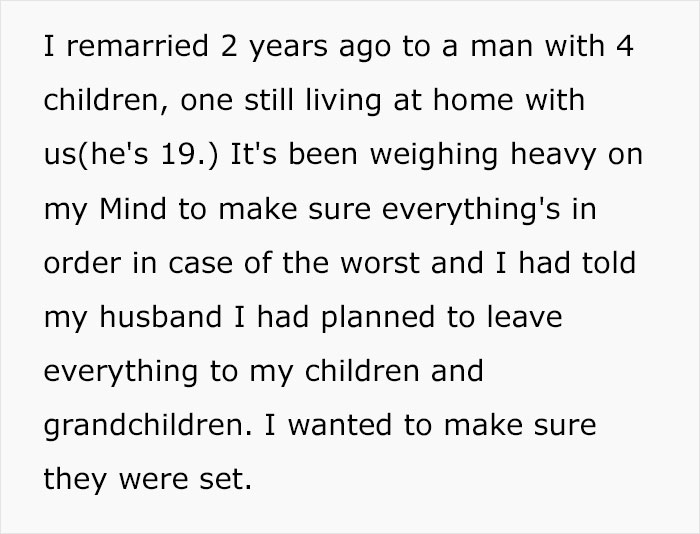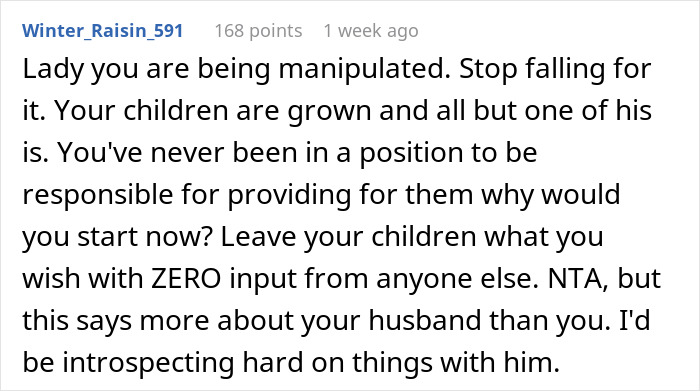Choosing what to do with the valuables or assets you’ve accumulated over your lifetime might not be easy; especially when you have to make up your mind about what exactly to leave to whom.
This woman decided to hand down all her possessions to her two daughters, leaving nothing to her husband’s children. The father of four said that what his wife was doing was “horrible”, consequently making the woman wonder if she was a jerk.
Seeking to better understand the complexity of the situation, we have gotten in touch with an Associate Professor and Chair at the Department of Sexuality, Marriage, & Family Studies at St. Jerome’s University at the University of Waterloo, Dr. Denise Whitehead, who was kind enough to answer a few of our questions about how inheritance-related matters can affect family relationships.
Bored Panda has reached out to the OP via Reddit and will update the article once we’ve heard back from her.
Certain illnesses might make people think about what would happen in case of the worst

Image credits: LightFieldStudios (not the actual photo)
This woman decided to leave all her possessions to her biological children, leaving nothing to her husband’s kids




Image credits: YuriArcursPeopleimages (not the actual photo)




Image source: Alternative_One_2709
Some significant life events tend to evoke disagreements among family members

Image credits: Gustavo Fring (not the actual photo)
It’s no secret that disappointment or even fights over someone’s inheritance are not that rare of an occurrence. Unfortunately, sometimes it even leads to families falling apart or people who care very much about one another turning away from each other.
“It never ceases to amaze that big life events like marriage and death can bring out the worst in family relations,” Dr. Denise Whitehead said in an interview with Bored Panda.
The expert emphasized that in situations like this, context is of great significance. In the OP’s story, for example, it’s important to note two things: the fact that the couple was married, even if only for a couple of years, and that their children were adults. “Under Ontario law, a married spouse would have certain entitlements – either because they were given proceeds through a will or if there was no will (died intestate) the partner could make a claim per the Family Law Act,” Dr. Whitehead explained, adding that they could also make an election under the FLA if the amount in the will wasn’t adequate.
“The law does not stipulate an obligation to leave a bequest in a will to anyone, including adult children or step-children. Thus, this woman could have chosen not to leave anything, even to her own biological children, and she would have been within her legal rights to do that,” the expert said.
The fact that the OP decided not to leave anything to her husband’s children put the partners’ relationship to the test. But she felt that it was right to leave her possessions to her daughters and her grandchildren and believed that her husband was free to do whatever he felt like with his finances, which he could choose to leave to his own biological children if he felt like it.
Children often become recipients of inheritance from their parents

Image credits: Pavel Danilyuk (not the actual photo)
Unsurprisingly, children are often the people who individuals bestow their property or possessions upon, as they are not only common beneficiaries (people inheriting property, as designated by a will), but heirs, too. Investopedia explains that, “an heir is a person who is legally entitled to collect an inheritance when a deceased person did not formalize a last will and testament,” who are typically children, descendants, or other close relatives of the decedent.
The Washington Post reports that in the US, more than 1 in 5 households had received an inheritance at some point in their lives as of 2022. According to said source, in the last three decades since 1992, the number of individuals getting an inheritance from their parents has nearly doubled.
According to Worldmetrics, in Denmark, nearly three-quarters of wealth transfers are made from parents to children (the remaining quarter being made largely from spouse to spouse). As for the situation regarding inheritance in other countries, the aforementioned source pointed out that in Poland, for instance, as much as 60% of population don’t have a will written up, leaving their inheritance undecided; in Belgium, roughly 37% of households have reportedly received or expect to receive an inheritance; while in Germany, over 200 billion euros (close to $215 billion US dollars) are inherited or given as gifts every year.
Having a conversation with family members about inheritance might minimize the likelihood of disagreements over it

Image credits: SHVETS production (not the actual photo)
Discussing the detrimental role inheritance often plays in family relationships, Dr. Denise Whitehead agreed that death and grieving and how estates are divvied up tend to bring up conflict in among members of the same kin, particularly if there is any person who has been outright excluded or when the children have not all been treated equally.
“The reasons for that are varied,” she said. “Sometimes, parents give more to an adult child who did a lot to care for them in older age. Sometimes, an adult child may have used older age and cognitive decline to convince a parent to give them more. Sometimes, a parent hasn’t had a close relationship and chooses to treat the children differently. Whatever the reason, this tends to breed conflict and much resentment among the children.”
Despite how uncomfortable and upsetting the circumstances regarding inheritance usually are, the likelihood of family drama stemming from it can arguably be minimized; to some extent, at least. In order to do that, the expert suggests sitting down to have a conversation regarding it with your family, no matter how unpleasant it may be.
“If necessary, consider a family therapist or a mediator to help the family members sort through the emotional baggage and grudges that have persisted,” she advised. “Many of these issues are not always new issues (that appear after the death of a parent), but [they] have a long smoldering history that rises to the fore when who got what in the will can be seen as the last time to fight over who was loved more.”
Dr. Whitehead emphasized that losing a partner or a parent is an emotionally trying time, and each person will express grief differently, which might sometimes be expressed as or entail anger and disagreements. And while it’s not easy, it’s important to try and be understanding of the people involved and the decisions they make under such circumstances and try to find ways to preserve long-term family relationships.
Fellow netizens didn’t think the woman was being a jerk to her husband or his kids

























